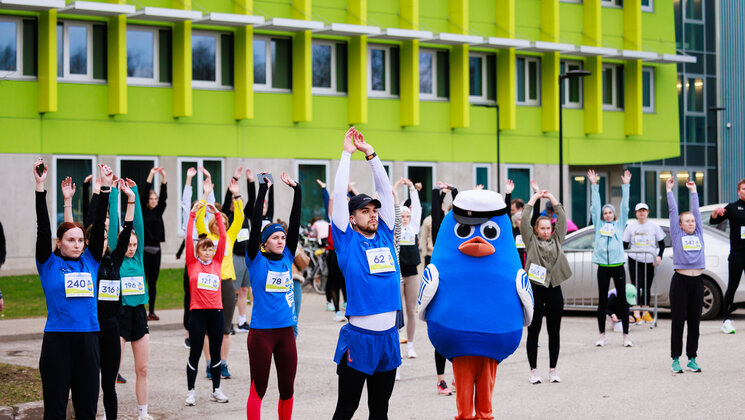-
Faculty of Arts and HumanitiesDean's Office, Faculty of Arts and HumanitiesJakobi 2, r 116-121 51005 Tartu linn, Tartu linn, Tartumaa EST0Institute of History and ArchaeologyJakobi 2 51005 Tartu linn, Tartu linn, Tartumaa EST0Institute of Estonian and General LinguisticsJakobi 2, IV korrus 51005 Tartu linn, Tartu linn, Tartumaa EST0Institute of Philosophy and SemioticsJakobi 2, III korrus, ruumid 302-337 51005 Tartu linn, Tartu linn, Tartumaa EST0Institute of Cultural ResearchÜlikooli 16 51003 Tartu linn, Tartu linn, Tartumaa EST0Institute of Foreign Languages and CulturesLossi 3 51003 Tartu linn, Tartu linn, Tartumaa EST0School of Theology and Religious StudiesÜlikooli 18 50090 Tartu linn, Tartu linn, Tartumaa EST0Viljandi Culture AcademyPosti 1 71004 Viljandi linn, Viljandimaa EST0Professors emeriti, Faculty of Arts and Humanities0Associate Professors emeriti, Faculty of Arts and Humanities0Faculty of Social SciencesDean's Office, Faculty of Social SciencesLossi 36 51003 Tartu linn, Tartu linn, Tartumaa EST0Institute of EducationJakobi 5 51005 Tartu linn, Tartu linn, Tartumaa EST0Johan Skytte Institute of Political StudiesLossi 36, ruum 301 51003 Tartu linn, Tartu linn, Tartumaa EST0School of Economics and Business AdministrationNarva mnt 18 51009 Tartu linn, Tartu linn, Tartumaa EST0Institute of PsychologyNäituse 2 50409 Tartu linn, Tartu linn, Tartumaa EST0School of LawNäituse 20 - 324 50409 Tartu linn, Tartu linn, Tartumaa EST0Institute of Social StudiesLossi 36 51003 Tartu linn, Tartu linn, Tartumaa EST0Narva CollegeRaekoja plats 2 20307 Narva linn, Ida-Virumaa EST0Pärnu CollegeRingi 35 80012 Pärnu linn, Pärnu linn, Pärnumaa EST0Professors emeriti, Faculty of Social Sciences0Associate Professors emeriti, Faculty of Social Sciences0Faculty of MedicineDean's Office, Faculty of MedicineRavila 19 50411 Tartu linn, Tartu linn, Tartumaa ESTInstitute of Biomedicine and Translational MedicineBiomeedikum, Ravila 19 50411 Tartu linn, Tartu linn, Tartumaa ESTInstitute of PharmacyNooruse 1 50411 Tartu linn, Tartu linn, Tartumaa ESTInstitute of DentistryL. Puusepa 1a 50406 Tartu linn, Tartu linn, Tartumaa ESTInstitute of Clinical MedicineL. Puusepa 8 50406 Tartu linn, Tartu linn, Tartumaa ESTInstitute of Family Medicine and Public HealthRavila 19 50411 Tartu linn, Tartu linn, Tartumaa ESTInstitute of Sport Sciences and PhysiotherapyUjula 4 51008 Tartu linn, Tartu linn, Tartumaa ESTProfessors emeriti, Faculty of Medicine0Associate Professors emeriti, Faculty of Medicine0Faculty of Science and TechnologyDean's Office, Faculty of Science and TechnologyVanemuise 46 - 208 51003 Tartu linn, Tartu linn, Tartumaa ESTInstitute of Computer ScienceNarva mnt 18 51009 Tartu linn, Tartu linn, Tartumaa ESTInstitute of GenomicsRiia 23b/2 51010 Tartu linn, Tartu linn, Tartumaa ESTEstonian Marine Institute0Institute of PhysicsInstitute of ChemistryRavila 14a 50411 Tartu linn, Tartu linn, Tartumaa EST0Institute of Mathematics and StatisticsNarva mnt 18 51009 Tartu linn, Tartu linn, Tartumaa EST0Institute of Molecular and Cell BiologyRiia 23, 23b - 134 51010 Tartu linn, Tartu linn, Tartumaa ESTTartu ObservatoryObservatooriumi 1 61602 Tõravere alevik, Nõo vald, Tartumaa EST0Institute of TechnologyNooruse 1 50411 Tartu linn, Tartu linn, Tartumaa ESTInstitute of Ecology and Earth SciencesJ. Liivi tn 2 50409 Tartu linn, Tartu linn, Tartumaa ESTProfessors emeriti, Faculty of Science and Technology0Associate Professors emeriti, Faculty of Science and Technology0Institute of BioengineeringArea of Academic SecretaryHuman Resources OfficeUppsala 6, Lossi 36 51003 Tartu linn, Tartu linn, Tartumaa EST0Area of Head of FinanceFinance Office0Area of Director of AdministrationInformation Technology Office0Administrative OfficeÜlikooli 17 (III korrus) 51005 Tartu linn, Tartu linn, Tartumaa EST0Estates Office0Marketing and Communication OfficeÜlikooli 18, ruumid 102, 104, 209, 210 50090 Tartu linn, Tartu linn, Tartumaa EST0Area of Vice Rector for ResearchUniversity of Tartu LibraryW. Struve 1 50091 Tartu linn, Tartu linn, Tartumaa EST0Grant OfficeArea of Vice Rector for DevelopmentCentre for Entrepreneurship and InnovationNarva mnt 18 51009 Tartu linn, Tartu linn, Tartumaa EST0University of Tartu Natural History Museum and Botanical GardenVanemuise 46 51003 Tartu linn, Tartu linn, Tartumaa EST0International Cooperation and Protocol Office0University of Tartu MuseumLossi 25 51003 Tartu linn, Tartu linn, Tartumaa EST0Area of RectorRector's Strategy OfficeInternal Audit OfficeArea of Vice Rector for Academic AffairsOffice of Academic Affairs0University of Tartu Youth AcademyUppsala 10 51003 Tartu linn, Tartu linn, Tartumaa EST0Student Union OfficeÜlikooli 18b 51005 Tartu linn, Tartu linn, Tartumaa EST0Centre for Learning and Teaching
Human Rights Centre recognises the University of Tartu with the quality label “Respecting differences”

The Estonian Human Rights Centre presented the diverse workplace quality label “Respecting differences” to the University of Tartu at Proto Invention Factory in Tallinn.
The diverse workplace label is awarded to an employer who values equal treatment and an inclusive organisational culture, and whose work in diversity management sets an example to others. It demonstrates the organisation’s commitment to supporting diversity and thereby creating a better working environment and society. The label is issued by the Estonian Human Rights Centre, and it has been introduced by the Ministry of Social Affairs. The label is valid for two years. This year, it is awarded for the third time. At the ceremony, Head of Human Resources Office Kristi Kuningas will accept the label on behalf of the university.
In a short interview, Legal Adviser Helin Jaakma of the Human Resources Office explains the reasons for applying for the label and how the university intends to promote diversity among its members.
Why did you decide to apply for the “Respecting differences” label for the university?
This spring we signed the Diversity Charter, coordinated by the Estonian Human Rights Centre. The objectives and themes of the charter have had an important place in the university’s policies for a long time already. Therefore, as the next step, it seemed only natural to apply for the diverse workplace label. We hope that it will help make our ongoing efforts to create a supportive learning and working environment even more visible.
What did you have to do to get the label?
We first completed a self-assessment questionnaire, and then compiled a diversity plan for the next two years, with an action plan including specific activities, deadlines, responsible parties and the budget. The plan was assessed by experts who found that we deserved the label.
As the university already had the Guidelines for equal treatment and had adopted the Gender Equality Plan at the end of last year, it was much easier to apply for the label because we had already given much thought to these issues.
What are you planning to do in the coming years to promote diversity?
Already this autumn, there will be two training sessions on the basics of equal treatment, conducted by Kelly Grossthal of the Estonian Human Rights Centre. We will also include training courses on this topic to the managers’ development programme so that managers could better identify and address workplace issues.
Probably the most challenging task is creating an online environment for equal treatment materials. The aim is to give more prominence to existing materials and make them easier to find, as well as create new content. In addition to discrimination and workplace bullying, the website will cover topics such as employees with special needs, parents with young children, reconciling research and family life, etc.
We also need to finalise setting up the network of equal treatment support persons. The support persons help students and staff understand who to contact in the event of unequal treatment. They also need to get training to carry out their tasks.
We will continue to support the adaptation of international staff and their spouses by offering them Estonian language courses. The monthly Live Positive Club series of events are held to discuss psychology issues, and both international staff and all other university employees are welcome to participate in the meetings. In addition, we regularly organise events introducing different cultures. There have already been 18 events introducing different nationalities and cultures. The next will be the Armenian Culture Evening in November.
We plan to start monitoring the situation of equal treatment by means of the annual job satisfaction survey. We will also take a closer look at the gender pay gap. The first steps have already been taken: the statistics dashboard now also shows pay gap in addition to general gender equality indicators. We plan to commission an analysis to identify the causes of this gap.
To increase the number of female professors, we want to support women researchers and help them move up the career ladder by offering leadership training, mentoring programmes and peer group counselling.
Why is respecting differences important?
It is very important to understand that equal treatment does not mean uniform treatment; on the contrary, it means recognising and respecting diversity. To put it very simply, respecting differences leads to happier and more motivated employees, a more effective organisation and a happier society.
“The label “Respecting differences” publicly shows that, as an organisation, we value a diverse membership and want our people to have the best possible experience here.”
Read more similar news






